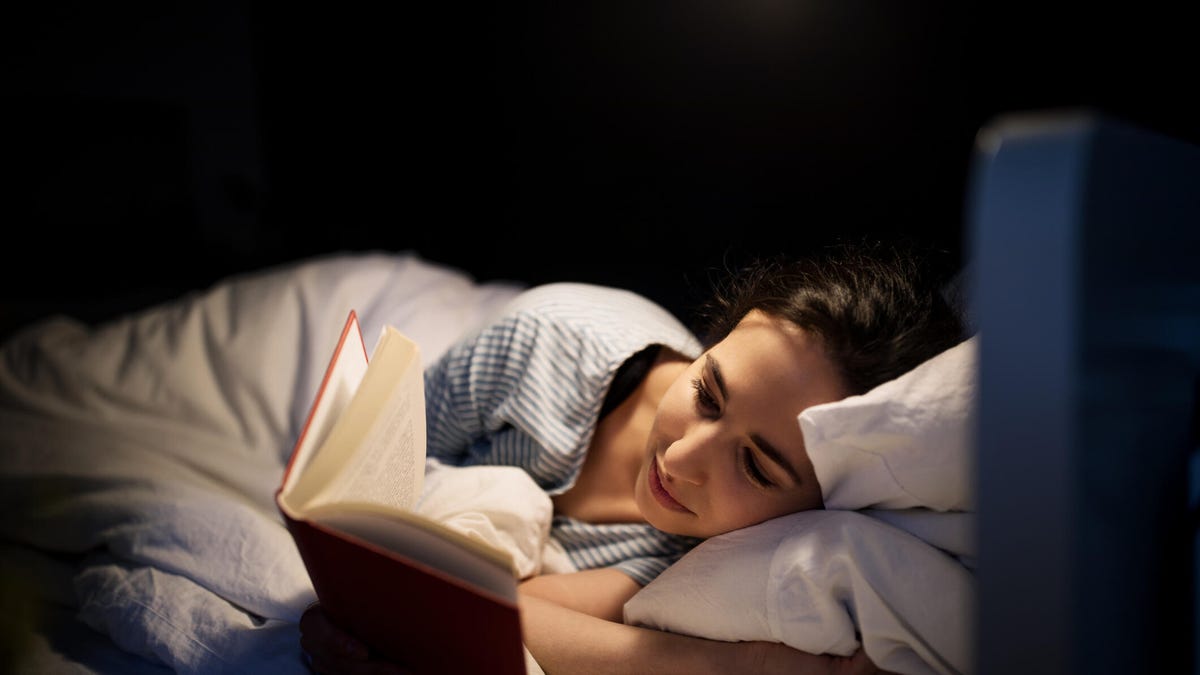Reading to Fall Asleep Changed My Life. Here's Why You Should Try It
I've been reading to fall asleep for years. It's my ultimate sleep hack.

Most nights, my boyfriend finds me sprawled across the bed, the light on and a book still in my sleeping hand. It's a regular occurrence in my house. Each night, after I brush my teeth and finish my skincare routine, I crawl into bed with a book. Within a few minutes, tension evaporates from my shoulders and I feel my body relax. Then I'm out.
Reading at night is my secret weapon for getting a good night's sleep. If my sage personal advice isn't enough to convince you, here are some real reasons you should be reading to fall asleep at night.
Why reading can help you fall asleep at night
It's relaxing and distracting
Why do we read in the first place? For many, it's to engross ourselves in another world and forget any stress or anxiety we're carrying. That's why I do it. Reading at night helps me redirect negative thoughts and enjoy what I'm doing at the moment.
There's no worrying about work, bills or impending family visits when you're deep in a good book. Stress and anxiety can make falling asleep harder and cause fragmented sleep cycles. Reading offers a way to redirect your thoughts. Studies have shown that reading for half an hour provides a comparable amount of stress relief to watching TV or doing yoga.
It helps you stay asleep for longer
For some, getting to sleep isn't the trouble -- it's staying asleep. Reading is a way to work your brain without physical activity. This means that instead of working yourself into being tired, you naturally relax and get sleepy without effort. Some research has shown that reading for a short time before bed can help you stay asleep longer throughout the night. A different 2021 online survey of over 900 participants found that of the 496 participants who read to fall asleep at night, 42% reported that their sleep quality improved.
It's good for your brain
OK, this one isn't exactly sleep-related, but it's worth mentioning. Reading is good for your brain. Reading is a more complex task for the brain than scrolling through your phone or watching TV. So by reading at night, not only are you relaxing, but you're strengthening the connections in your brain and potentially preventing age-related cognitive decline. Reading has also been tied to more empathy and better concentration.
It will become a habit
Integrating reading into your nighttime routine will signal your body that it's time to sleep. Once it's a habit, you'll find your eyelids getting heavy shortly after you've snuggled up in bed with a good book. Sometimes, I can fall asleep before I even get through a chapter because it's a defined part of my nighttime routine.
How not to read to fall asleep
As with everything, there is a right and wrong way to do things. Make sure you avoid these pitfalls when reading to fall asleep.
Don't read for too long
Admittedly, there are a few caveats I have to mention about reading to fall asleep. Depending on where you are in your book, you can accidentally read too long and eat into the time you should be asleep. We've all been there. To solve this, I like to set a chapter limit that I can't cross -- no matter if things are starting to get good. Another tip to ensure that reading doesn't impact your ability to sleep is to steer clear of books that will cause a significant emotional response.
Don't read on your phone
You should avoid reading on screens that give off blue light. Blue light interrupts the body's natural melatonin production. Melatonin is the hormone that helps our body regulate the circadian rhythm or sleep/wake cycle. When the sun is up, melatonin production is blocked to keep us from getting tired. As the sun sets, melatonin is released and we get tired. Blue light throws off this process, making it harder to get quality sleep.
Reading can't be the only thing you do
As much as I hate to admit it, reading isn't a magical cure-all for poor sleep hygiene. It can't replace everything that goes into sleeping; it's merely a supplement. You should watch your caffeine intake in the afternoon, avoid spicy or heavy meals before bed and always prioritize sleeping -- no matter how good the book is.

